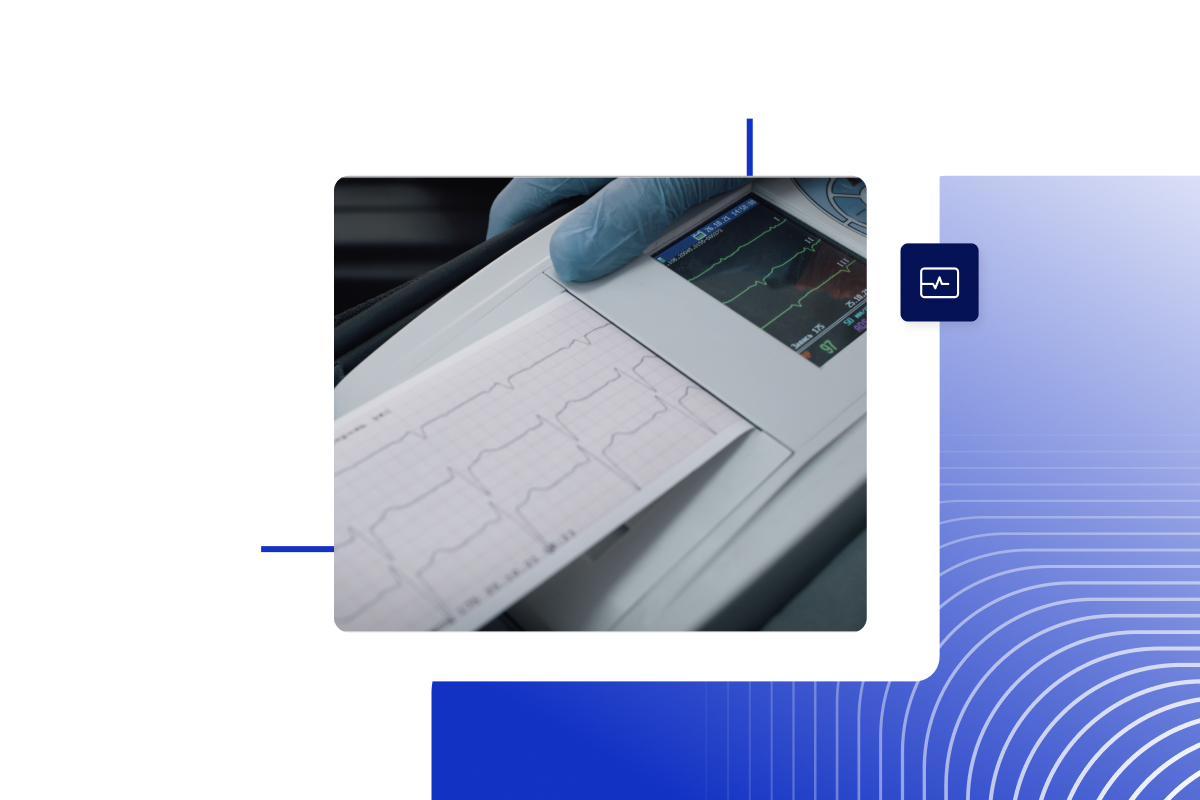As global statistics show, cardiovascular diseases remain a leading cause of premature mortality [1], with an alarming toll of approximately 17.9 million lives each year [2]. ECG (electrocardiogram) devices play a crucial role in the diagnosis and screening of various heart diseases as well as the prevention of cardiac fatalities.
While the 12-lead ECG device remains a standard, innovations in the healthcare industry have made it possible to effectively record the heart’s electrical activity also via handheld ECG devices and Holter monitors.
This article explains in more detail how Ambulatory ECG Holters and Handheld ECG devices compare to the 12-lead ECG to help you choose the best option for your patients.
Our CMO, Robert Herman, MD, discusses the future roadmap for leveraging AI in the ECG interpretation landscape on the Mayo Clinic podcast.
Ambulatory ECG Holter v. 12-lead ECG
ECG Holters allow the continuous recording of three or more leads for 24-48 hours, allowing physicians to monitor heart activity outside the clinical setting. These ambulatory monitors are useful for certain arrhythmias, which can be difficult to capture using conventional ECG devices.
However, ECG Holters have certain limitations. For one, the results aren’t as readily available as with a standard 12-lead ECG device since the device’s electrodes must be attached to the patient’s skin for at least 24 hours. This fact brings with it another nuisance – this time for patients who may not tolerate wearing the device on their body for such a long period of time. Also, Holter monitors require a certain level of specialization in using and interpreting the results, further limiting their access to patients who might need them [3].
Unlike conventional ECGs, Holter monitoring requires close collaboration between patients and physicians since the whole process of collecting patients’ cardiac data is conducted outside the clinical setting [4]. Patients are usually instructed to keep a diary of their symptoms to help physicians correlate any abnormalities in heart activity with their symptoms. Often, though, patients fail to comply with these instructions, further limiting the diagnostic abilities of ECG Holters [5].
Portable ECG monitor vs. 12-lead ECG
Handheld ECG monitors are portable devices for at-home heart monitoring that capture electrical impulses from the heart via finger or chest electrodes. Among other things, these devices are useful for detecting episodic rhythm disorders.
Its ability to monitor heart activity repeatedly at home and thus detect episodic heart failures is where 12-lead ECG falls short, it being able to capture the heart’s electrical activity during a doctor’s visit only.
Comparing the two, however, may be slightly inadequate. While 12-lead ECGs are readily available as a medical-grade diagnostic tool, crucial for detecting and diagnosing cardiovascular conditions, such as heart failure and arrhythmias, handheld ECG monitors mainly serve as screening tools, helping detect disease in a healthy population with no symptoms.
This is what keeps portable ECG devices from wider usage. Since healthy people rarely purchase these devices for at-home use, proper public education is necessary to increase awareness, especially in at-risk populations that have yet to display signs and symptoms of heart disease.
Another thing to consider is that certain heart conditions, such as arrhythmia, may go undetected by the portable ECGs, unlike 12-lead ECGs. This is especially the case with single-lead handheld devices, which have a relatively high potential for false-negative results, which could lead to a diagnostic error or overlooking a pathology [6].
In terms of research and publicly available literature, there is still a shortage of information on the diagnostic accuracy, reproducibility, or utility of portable ECG devices. This could be due to the early-stage development of such devices and the lack of regulatory measures mandating robust studies before the launch of these devices [7].
High clinical utility of 12-lead ECGs
The 12-lead ECGs are still the gold standard in electrocardiography. That is mainly due to their medical-grade diagnostic accuracy and increasing accessibility in the healthcare landscape. Around 8 in 10 GPs in the EU currently have access to 12-lead ECGs, making it one of the most accessible and vital devices for detecting and diagnosing heart conditions.
More and more research is being dedicated to 12-lead ECGs due to the vast amount of digitally-available data over the last two decades. The robust research efforts delegated to 12-lead ECGs will continue to progress and develop their clinical utility and potential. They are still far from being replaced as a non-invasive and medical-grade diagnostic tool, despite them requiring considerable expertise to interpret the collected data.
This is where modern machine learning and AI tools come into play.
Powerful Medical’s PMcardio is an AI-driven clinical assistant that helps healthcare professionals interpret and digitize 12-lead ECGs to optimize the detection and treatment of cardiovascular conditions.
Our AI model has been trained on millions of previous cases. It can quickly diagnose 44 different heart conditions and 9 measurements based on ECGs with the accuracy of an experienced cardiologist.
You can incorporate PMcardio into any existing hospital infrastructure as it is available as an easy, user-friendly smartphone application.
From diagnosing heart conditions and digitizing ECG records to providing treatment recommendations based on the latest guidelines—PMcardio enhances how you deliver patient care via ground-breaking AI technology.
Want to interpret 12-lead ECGs faster and with higher confidence?
Then get PMcardio! After taking a photo of an ECG with your phone, PMcardio will digitize it and interpret the tracing in seconds. The app also includes treatment and patient management recommendations – adherent to the latest medical practice guidelines.
















